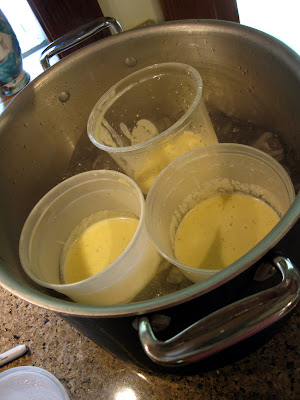Markouk (
mar-kook) is a Lebanese paper-thin
flatbread that my grandmother and great-aunt used to help their mother make when they were little girls. When my great-aunt comes to visit over the holidays, she usually brings four or five bags of it with her. Shocker, I know, but no one in
Sevier County, TN sells
Markouk. And if they did, whoever bought it would probably be lynched for being a "terrorist." Gotta love the G-burg.
Anywho, since our
Markouk indulgences are few and far between, Mom and I decided we should figure out how to make it. And, since I'm in "Advanced Baking," we thought we could ask Chef
Hallman (the omniscient) if she knew how to make it. Of course, she didn't let us down. And here is what we made today, on our last day of Advanced Baking...
Ladies and Gents...
Markouk.
Sevier County style.
Ingredients:
3 tsp. instant dry yeast
2 tbsp. sugar
2.5 cups warm water
7 cups all-purpose flour
1 tsp. salt
First, combine the flour with the yeast and mix in an electric mixer on low speed (with the dough-hook paddle). Next, add in the rest of your ingredients into the mixing bowl.
(NOTE: When adding "warm" water to any baking recipe, test the water with your finger before you add it. If it feels warm to you (warmer than your body temperature) it is much too hot for the dough and you will start the cooking process to soon. If it feels like your cheek (feel free to feel your cheek...
haha), it is the perfect temperature - around 98.6 degrees F).

Mix on medium speed until it becomes a dough glob. As it spins in the bowl, it will pick up the excess flour on the sides.

Once it looks like dough (it will be a fairly stiff dough), cover it with plastic wrap and let it sit at room temperature until it doubles in size (for the amount of dough in the pictures, it took about 30-45 minutes to ferment).

When it has doubled, dump the dough out onto a lightly floured work space and "punch" it. No, don't hit it with your fist, just stretch it a little and fold the four "corners" underneath until it looks like a smooth ball. Let it rest for five minutes (aka: leave it alone, on the counter).
After the dough rests, divide it into 2 oz. balls. Then flatten each dough ball with your hand, roll it out with a rolling pin, and stretch it with your hands. Honestly, do whatever you possibly can to get it flat and even. If it gets stiff and hard to work with, let it rest again. Dough is quite temperamental when it comes to being poked, prodded, and stretched.

Once they are rolled out, put them on a sheet pan and layer parchment paper between each layer of dough discs.

Now, ladies and gents, comes the fun part. Toss them around! It's great fun, I promise. But, if you are
uncoordinated like me, don't be too upset if you lose a few to the floor.

Onto how to cook these bad boys...
Traditionally,
Markouk is cooked on a heated metal dome. We, however, did not have a fancy Middle Eastern heated metal dome for cooking Lebanese bread, so we made due with what we did have: a Wok. And hot damn if it didn't work like a charm. We just oiled the back of a Wok, put it over a flame (a burner would do just fine), and went to town!

I know that the photo above shows Lanna using tongs... don't use tongs. It rips them to shreds and is quite awkward. Instead, use your fingers to flip the bread once it cooks on one side. But, be careful! Woks are thin and get super duper hot!

As they cook on the Wok bottom (
hehe), the will bubble and brown. Yum! Just use your judgment to decide when they are to your liking.

And would you look at that! Fresh, homemade, Lebanese bread in the hills of
Sevier County. If you'd told me this would be happening yesterday, I wouldn't have believed you. So, if you are intrigued, I suggest you try it! They were delicious. You can eat them plain, sprinkle them with salt, brush them with butter, or use them to dip into Hummus or some delicious dip. Enjoy making your
Markouk! I know we did!

 P.S. Don't tell my teachers about the bottled salad dressings, lettuce from a bag, or tomato sauce in a jar.
P.S. Don't tell my teachers about the bottled salad dressings, lettuce from a bag, or tomato sauce in a jar. 

















